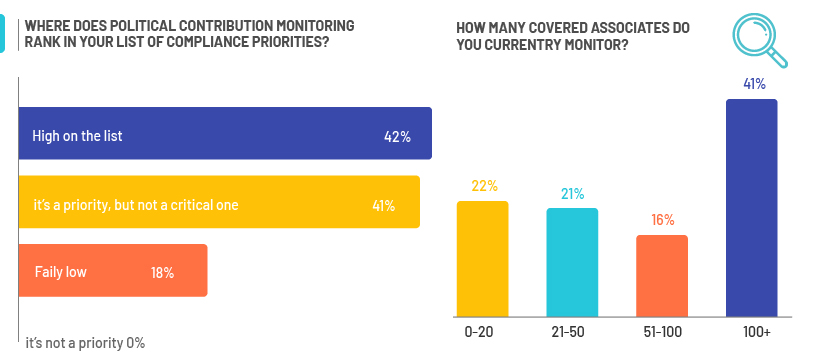Published on May 7, 2024 by Mary Fernandez and Jeevitha Jaganatha
Roughly half of the world’s population is conducting executive/legislative elections in 2024 (including the US, India and the European Union – which together comprise 49% of the world’s population). Globally, more voters are expected to head to the polls than ever before; it’s set to be the busiest election year ever recorded. While this is great for democracy, it poses a challenge for financial services organisations; with a highly charged political climate, this election cycle might increase political/employee contribution towards political activities, thus chances of violating the pay-to-play rule are potentially high. As a result, firms must pro-actively ensure that they are and will remain in compliance by following the policies and procedures in place to monitor their employees’ governmental relationships and political contribution to prevent conflict of interest that could hamper their reputation.

Source: Mapped: 2024 Global Elections by Country - Voronoi (voronoiapp.com)

Source: Mapped: 2024 Global Elections by Country - Voronoi (voronoiapp.com)
What is political contribution?
Candidates running for election require funds to campaign. Sources of funding can be received from individuals, corporations, political committees and, in some cases, the government.
When employees provide funding for federal, state or local elections, they are required to adhere to a policy known as ‘Political Contribution’, which is a contribution made in the form of cash or kind to a political campaign/party.
Importance
A policy around political contribution helps an organisation assess whether funding provided by an employee aligns with the company’s values to address issues such as conflict of interest. Transparency in reporting contributions to and from a political party or concerned persons is important to ensure fairness in campaigning and business and that warranting transactions are legitimate. Employees have a right to contribute from their personal savings but are bound by pre-defined guidelines set by their organisation. Employees must be aware of how much, to whom and why they are contributing. If an employee makes contributions with the help of a third party, due diligence should be conducted to analyse the nature and values of the organisation, as well as compliance procedures and controls related to political contributions. For example, government officials may choose investment advisers that charge higher fees and provide low performance funds, owing to the contributions made. To avoid such situations, instead of eliminating political contributions, regulators, such as the Securities and Exchange Commission (SEC), have coined the term ‘pay-to-play’ to achieve integrity in such transactions.
Role of regulators
Rule 206(4)-5: Introduced in 2010, the rule applies to registered investment advisers and entities that are exempt from registration with SEC, but their nature of business involves partaking in advisory services. According to SEC, after a political contribution is made to a candidate running for election or an elected candidate, investment advisers should refrain from providing advisory services in exchange for a fee for two years after contribution. Investment advisers cannot seek funds or sponsors for candidates running for election or an elected candidate for whom they plan to provide services for. The rule is introduced to address pay-to-play practices, whereby investment advisers that handle public pension funds and government accounts receive preferential treatment in return for a contribution. Advisers are required to maintain records of political contributions; failing to comply with the rule or its requirements can lead to fines and regulatory action. SEC has restricted contribution from investment advisers and fund managers to certain politicians that can influence investment decisions for state pension funds. As per SEC, investment advisers and fund managers can contribute up to USD150 to any candidate or up to USD350 if they are voting for a candidate who is running for election.
2030 & 4580 – According to FINRA, investment advisers are registered under the Investment Company Act, in which they cannot provide distribution and solicitation services to a candidate running for election or an elected official in exchange for a fee for a two-year period after contribution.

Source: How to navigate FINRA and SEC pay-to-play rules in 2023 | COMPLY
In the past, SEC has fined and issued a cease-and-desist order opposing a US investment management firm for violating the agency’s pay-to-play rule for investment advisers; the company was fined USD100,000 as a civil monetary penalty. Over 2013–2017, two associates contributed to the political campaigns for the governor and treasurer of Ohio with whom they do business within the forbidden two-year period after contribution. The firm had provided advisory services for compensation to the public pension system and the public university.
In 2022, SEC fined four advisory firms for USD300,000 for violating the commission’s pay-to-play rules. These entities had violated the rule by continuing to receive compensation from government entities within two years of the contribution to the elected office candidates; these candidates were involved in making the final decision of choosing the investment advisers who provide advisory services for government entities.
Setting up an effective contribution-monitoring programme can mitigate the risk of failing to comply with the rule or regulation, fines and regulatory action set in accordance with political contribution. The following are some effective methods:
-
Thoroughly know and be up to date with the rules and regulations of political contribution and local regulations
-
Identify all the employees who are covered under the pay-to-play rules. Not all financial professionals are aware of all the rules for political contribution, so the best practice is to educate
-
Develop an effective self-reporting system. Adapt pre-approval processes in which an employee self-reports political contribution as a part of the annual compliance check or as a new hire compliance check
-
Implement technology to monitor political contribution to mitigate manual errors and for easy and fast processes
How can Acuity Knowledge Partners help?
Our Compliance team helps firms track political contributions of employees to avoid regulatory action and reputational risks for the employer and individual. When conducting due diligence of managers, we investigate their compliance manual to ensure there is a policy around political contribution and permissible limits for contributions. It is important to note the procedure in which these transactions are precleared; if necessary, trainings on a code of ethics are conducted to educate employees on limits, disclosure, risks and compliance. The idea behind the investigation is to ensure that necessary controls are in place to avoid risks that could hamper the regular working of an organisation.
Sources
-
Engaging in Distribution and Solicitation Activities with Government Entities | FINRA.org
-
Books and Records Requirements for Government Distribution and Solicitation Activities | FINRA.org
-
https://www.visualcapitalist.com/2024-global-elections-by-country/#google_vignette
-
The SEC pay-to-play rule for investment advisers as it turns 12 | Reuters
-
Political Contribution Monitoring Techniques & What You Need to Know - Aristotle
What's your view?
About the Authors
Mary Ann Fernandez is a Senior Associate and has been associated with Acuity Knowledge Partners for four years. At Acuity Knowledge Partners she is part of the corporate and forensic compliance team and is part of the operational due diligence team for a client. She is a graduate who specialized in Finance and Accounting and holds a Bachelors degree from Christ University, Bangalore.
Jeevitha Jaganatha has over 3 years of experience in Corporate and Forensic Compliance at Acuity knowledge Partners and is currently working in Electronic Communication Surveillance and code of ethics. She holds a master’s degree in business administration, specializing in International Finance and Accounting from Jain University, Bengaluru
Like the way we think?
Next time we post something new, we'll send it to your inbox










